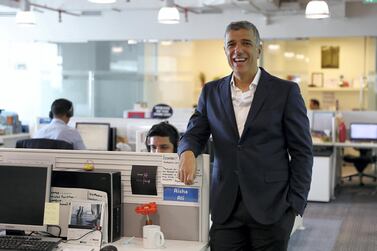Rabea Ataya, the founder of online recruitment platform Bayt.com, is a source of inspiration for many young entrepreneurs in the Middle East. He started the region's longest-running internet business in 2000 with only four employees, and has since overseen its growth to become a company with 400 staff in 13 offices, serving over 35 million professionals across the region.
Before setting up Bayt, the Stanford graduate worked at an investment bank briefly, and then founded InfoFort, the Middle East's first data management company, which was later sold to logistics company Aramex.
Mr Ataya serves on the board of several regional start-ups, has invested in nearly 20 companies and also co-founded Gonabit.com, the region's first crowdfunding e-commerce website.
Here, he shares with The National his top tips for a successful start-up.
What are your top three guiding principles for today’s entrepreneurs?
First, be passionate about your idea and ensure that you really care about what you are building. Second, pick your partners very carefully. These days, entrepreneurs are in such a rush to start a business that they will partner with anyone, it could be quick but the foundation of the business will be poor down the line. Third, set a deadline and always have clarity over your goals. When we started Bayt, we decided we wanted to raise certain capital in a specific period and if we were unable to, then we would not continue. Therefore, entrepreneurs should be disciplined about getting into profitability mode fast with no aimless moving around.
How might entrepreneurs overcome the risk of failure?
Risk of failure is an inherent part of any business and it will be always there, but it should not prevent entrepreneurs from taking action. Knowing there is a risk of failure, an entrepreneur should plan adequately to stay safe. Assessing possible dangers and having a realistic view of the market are very important. For example, a realistic view is that any business can go bankrupt, so a back-up plan should be ready.
If you could go back in time and change something from your history, what would that be?
We were very aggressive in scaling up in the Middle East, which was wonderful, and now we are doing it outside the region. Now, when I look back, I feel, perhaps, I should have been bolder about scaling outside the Middle East during the early stages of my entrepreneurial journey. Usually, entrepreneurs complain about not being bold enough during the early stages. This is a thumb-rule: start thinking big very quickly.
How would you compare the market when you started Bayt with today's?
Since we started in 2000, we have seen an incredible amount of change in the region's start-up scene. Then, when we were out looking to raise capital, there were no venture capital funds to begin with – only friends and family, and no other ways to raise money. Today, there are hundreds of millions of dollars’ worth of venture funds across the region. In 2000, there were also issues with foreign investments. There was a list of various company categories to pick from and if you were not among them you were at a disadvantage. Today, incorporating a company has become a lot easier, drawing in foreign investment is easier, and laws have changed across the region.
Is human capital an issue in the Middle East?
From a human capital perspective, this is the best time. More young people are interested in joining start-ups, whereas in 2000, most of the smart people were interested in joining big multinationals, having a corporate life and they didn’t want to take a risk. Today, bright minds see start-ups as opportunities to learn and grow.
How do you decide whether or not to invest in a company?
The foremost deciding factor is the entrepreneur – the person pitching the idea. He should be full of passion and possess a track record of proven credibility and success. Also, the business idea should make sense, especially in the context of the market in which it will be executed.
What is the biggest challenge facing regional entrepreneurs?
Scaling up – reaching the largest chunk of the population – is one of the biggest challenges for entrepreneurs and start-ups in this part of the world. It is difficult because of many things, such as the legal framework. For example, if I am a Dubai-based entrepreneur and I want to do business with the Abu Dhabi Government, I need to have a different licence. By contrast, in Europe and America, you can incorporate a business in one place, say Delaware, and be able to operate across markets spanning 350 million people.
We have evolved at a tremendous pace and it is a lot easier now than it was 18 years ago, but we still have a journey ahead.








